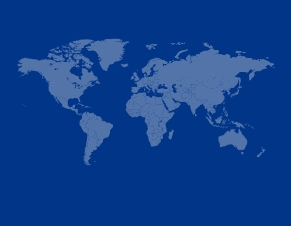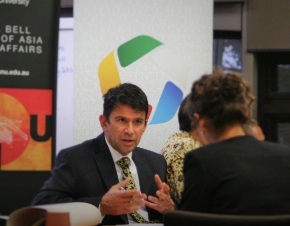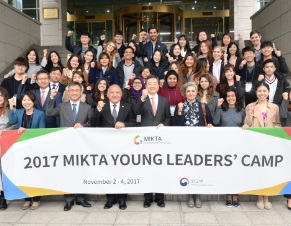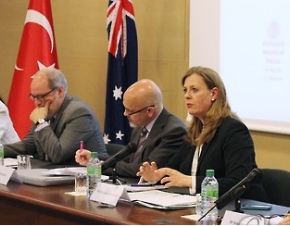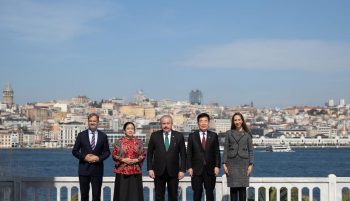6th MIKTA Speakers’ Consultation to Reinforce the Global Standing of the Five Middle Powers
 1.jpg (2.39 MB)
1.jpg (2.39 MB)
 2.jpg (3.02 MB)
2.jpg (3.02 MB)
 3.png (435.21 Kb)
3.png (435.21 Kb)
 4.jpg (2.77 MB)
4.jpg (2.77 MB)
 press release_mikta 2020.docx (20.03 Kb)
press release_mikta 2020.docx (20.03 Kb)
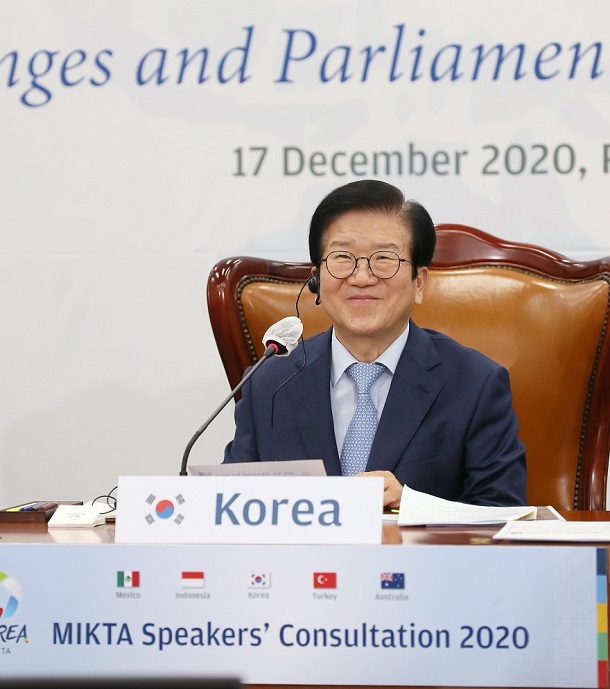
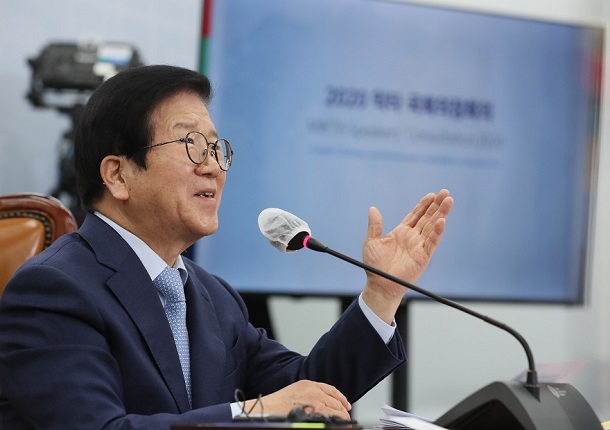
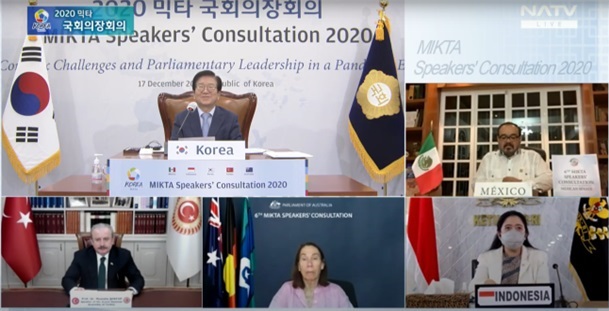

Five Parliaments of MIKTA Issue Joint Statement Calling for Multilateral Cooperation to Tackle Complex Challenges Amid the Pandemic
– The 6th MIKTA Speakers’ Consultation hosted by the National Assembly of the Republic of Korea in a virtual format under the theme “Complex Challenges and Parliamentary Leadership in a Pandemic Era”
– Parliaments of the five middle powers to serve as a bridge in global cooperation to tackle multidimensional crisis caused by the COVID-19 pandemic
– “ The MIKTA Speakers’ Consultation needs to support the efforts of the international community toward the development and equitable distribution of vaccines and therapeutics,” said Speaker Park Byeong-seug
The 6th MIKTA Speakers’ Consultation, hosted by the National Assembly of the Republic of Korea, took place at 1:00 pm (local time, UTC+9), December 17. This year’s conference was held in a virtual format for the first time, bringing together parliamentary leaders of all five countries of MIKTA.
The 2020 iteration of the MIKTA Speakers’ Consultation marks the beginning of the second cycle of hosting the multilateral meeting by the MIKTA parliaments, which had hosted one meeting each, beginning with the Republic of Korea in 2015, followed by Australia, Turkey, Indonesia, and Mexico.
The five middle powers, which represent each continent and region, discussed from a parliamentary perspective ways to address deepening nationalism and polarization driven by the COVID-19 pandemic under the theme “complex challenges and parliamentary leadership in a pandemic era” and issued a joint statement on the results of the discussion.
Despite the time differences*, the meeting was attended by parliamentary leaders of all countries of MIKTA: H.E. Park Byeong-seug, Speaker of the National Assembly of the Republic of Korea; H.E. Puan Maharani, Speaker of the House of Representatives of the Republic of Indonesia; H.E. Mustafa Şentop, Speaker of the Grand National Assembly of Turkey; Senator Jorge Carlos Ramirez Marin, Deputy Speaker of the Mexican Senate; and Senator Sue Lines, Deputy President of the Australian Senate.
*13:00 Korea / 22:00 Mexico / 07:00 Turkey / 11:00 Indonesia / 15:00 Australia
In session 1, themed, “Five Years of MIKTA Speakers’ consultation: Challenges in a Pandemic Era,” parliamentary leaders of MIKTA shared their views on emerging crises and tasks brought on by COVID-19 such as capacity building for infectious disease control, equitable access to vaccines and therapeutics, economic recovery and regression in gender equality.
“We must improve and strengthen the current global health governance led by the WHO to overcome COVID-19 and prepare for similar health emergencies, and this requires cooperation among MIKTA member countries,” said Speaker Park Byeong-seug of the Korean National Assembly. “As MIKTA agreed to serve as a bridge between developed and developing countries and between and among different regions, the MIKTA Speakers’ Consultation needs to support the efforts of the international community toward the development and equitable distribution of vaccines and therapeutics.”
He also asked for continued support for an inter-Korean parliamentary meeting, saying “Inter-Korean cooperation on public health and infection control measures for humanitarian purposes can contribute to trust- and peace-building efforts. A few months ago, I made an official proposal to the Speaker of the Supreme People’s Assembly in North Korea to hold an inter-Korean parliamentary meeting with no conditions attached.”
Deputy Speaker Jorge Carlos Ramirez Marin of the Mexican Senate reiterated MIKTA countries’ commitment to supporting and cooperating with the World Health Organization (WHO) to tackle COVID-19. He also stated that “It is necessary to strengthen efforts towards the creation of conditions that contribute to economic growth, to the dynamics of domestic and international markets.”
“We must be optimistic that COVID-19 can be overcome through global cooperation…our Speakers’ Consultative must empower itself for growing multilateralism,” said Speaker Puan Maharani of the House of Representatives of the Republic of Indonesia. “Gotong Royong* is the concept that Indonesia could lend to the rest of the world, to inspire commitment for stronger cooperation to address the challenges of COVID-19…almost a year of living with the pandemic, one thing has become clear. Unitary measures and protectionism are ineffective.”
*Gotong Royong means the spirit of cooperation to achieve common goals.
Speaker Mustafa Şentop of the Grand National Assembly of Turkey said “when it comes to vaccines, gaps are emerging between developed and developing countries.” “Powerful nations and international organizations should work together rather than compete each other, and find ways to cooperate by improving multilateral relations.”
Deputy President Sue Lines of the Australian Senate expressed concern over the “years of progress in promoting gender equality at home and at work” coming undone due to the COVID-19 pandemic and stressed that economic recovery from the pandemic must reduce gender segregation in the workforce.
In session 2, themed, “Inclusive Parliamentary Leadership for the Socially Vulnerable in a Pandemic Crisis,” participants shared their views on the achievements and tasks of each parliament in supporting the socially vulnerable disproportionately affected by COVID-19 including women, the elderly, youth, persons with disabilities, migrants and refugees, low-income populations, low-skilled workers, self-owned businesses, service workers, etc.
“Recognizing the huge changes in labor and society, the Korean National Assembly has continuously pioneered legal and institutional support for the provision of quality education services, development of capacity building programs for workers, and maintenance of a work-and-family balance,” said Speaker Park Byeong-seug. “We must remember that the crisis is more ruthless on vulnerable groups, and not halt in our drive toward social integration and construction of an inclusive society.”
Deputy Speaker Jorge Carlos Ramirez Marin of the Mexican Senate introduced some of the measures that Mexico has taken including remote learning through television broadcasts and government subsidies for vulnerable populations. He also shared the current status and challenges of migration from neighboring countries in Central America.
Speaker Puan Maharani of the House of Representatives of the Republic of Indonesia introduced Indonesia’s expansion of the state spending to provide for healthcare, social protection system, and the national economic recovery programs, and said “All of the recovery policies should not only focus on getting the economies and livelihoods quickly back to condition prior to the pandemic. Safeguarding prosperity for the longer term with a people-centered focus on well-being and reducing inequality as well as environmental protection should remain to be our priority.”
Speaker Mustafa Şentop of the Grand National Assembly of Turkey stressed the responsibilities of all countries in addressing separatism, racial discrimination and hatred exacerbated by COVID-19.
Deputy President Sue Lines of the Australian Senate mentioned the lack of measures put in place or considered for people with a disability during the outset of the pandemic, saying that “people with disability were not provided with clear and consistent information.” She emphasized the need to “value and prioritize all avenues of communication available with groups and individuals who may not be able to participate in conventional forms of parliamentary discourse,” as well as the imperative that “parliaments and governments must build-in inclusive strategies throughout all our future crisis response and recovery plans.”
Concluding two months of intensive collaboration from agenda development to thematic discussions today, parliamentary leaders of the five MIKTA countries adopted a joint statement expressing their determination to overcome complex challenges posed by COVID-19 at the parliamentary level.
In the Joint Statement, speakers of MIKTA parliaments i) reaffirmed the roles that the MIKTA Speakers’ Consultation has been playing since its inauguration in complementing international cooperation led by governments, ii) recognized common challenges the COVID-19 pandemic has underscored such as protectionism, unemployment, and discrimination, iii) reiterated the significance of parliamentary leadership for the post-COVID-19 era and the critical role of MIKTA in multidimensional responses and cooperation at the national, regional, and global levels, iv) agreed to exert their leadership and forge partnership to exchange best practices on control and prevention of diseases, fair and equitable distribution of COVID-19 vaccines, medicines, and medical devices as well as strengthening multilateralism, v) shared the view on parliamentary roles and responsibilities for the inclusion of the socially and economically vulnerable, and stressed the importance of gender equality.
The 7th MIKTA Speakers’ Consultation will be hosted by Australia in 2021. The 6th MIKTA Speakers’ Consultation is expected to contribute to the further development of the multilateral consultative body as a key cooperative mechanism for advancing the public good for the international community.


